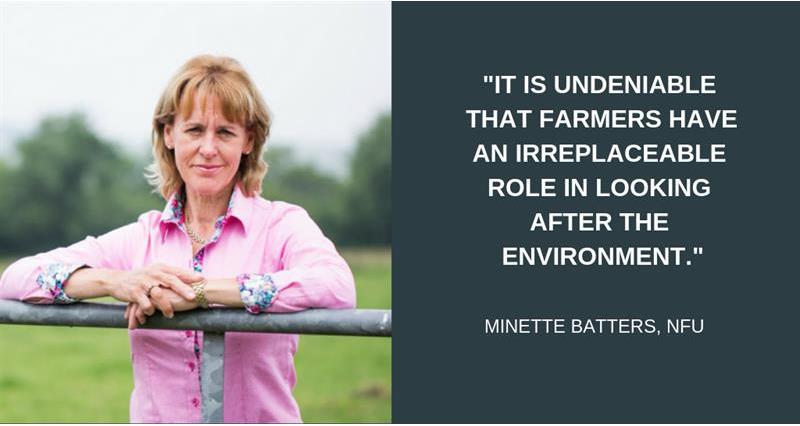NFU President Minette Batters discusses the crucial role farmers have in enhancing the environment.
The farmland bird count involved over 1000 farmers last year, recording over 121 species over 950 acres and 25 red-listed species. This, a voluntary approach to give us a litmus test for our national bird population shows the active interest in biodiversity in the farming community.
The last thirty years have seen up to 70% of agricultural land in voluntary agri-environment schemes aimed at environmental enhancement and tackling climate change. In recent years however, involvement has been declining. This is thought to be largely as a result of changes in policy, design and accessibility, with many farmers critical of current schemes due to their lack of specificity.
Without clear objectives, it is difficult to make an assessment of whether or not they have succeeded. Further compounding factors include an application process that many find burdensome and challenging to complete.
Farmers are the original friends of the earth but there are challenges too. We already work hard to maintain and enrich habitats and wildlife, improving soil and water quality and managing flood risk through day-to-day farm activities. This includes planting and managing hedgerows not only to set field boundaries and shelter for livestock, but also increases the potential for carbon storage in woody biomass, reduces flood risk through improvements in water infiltration rates to soil and increases habitat resource availability for wildlife, including species that are essential in crop pollination and controlling other pest species.
Farmers also operate in a commercial environment and they must run their businesses to earn their livelihoods in a global market that does not reward positive environmental outcomes. This is the basis for agri-environment schemes to help support farmers achieve environmental goods in a competitive market – but what lessons can we learn from the past and how can we ensure value to farmers and the taxpayer for what the food industry struggles to recover from the consumer in the longer term?
In addition to the criticisms of current agri-environment schemes, there is the added challenge of a national lack of appreciation for the scale and range of environmental activities that farmers carry out. We believe that formal capture of up to date and detailed data is needed in order to deliver farmers an appropriate financial reward for the work that they do and to provide a benchmark of a farm’s current situation in regards to measures such as soil quality. This data is essential in supporting the work that is carried out and will allow farmers to measure their progress towards productivity improvements, as well as reductions in their environmental footprint.
Improving productive efficiency, using targeted measures to increase and manage on-farm carbon storage and coupling land-based renewable energy to carbon capture are some of the ways that we believe our sector can continue to bring improvements for the environment. Our industry is unique in that it is the only sector currently capable of removing carbon dioxide from the atmosphere, through carbon storage in soil and vegetation and through the many forms of low carbon renewable energy. It is our industry’s ambition to utilise this exclusive position and reach a net zero contribution to climate change across all agricultural production by 2040.
Food producers must be at the heart of future environmental policies because farmers are in the best position to manage land for future environmental benefits. Policies that support this environmental enhancement and sustainability are essential in ensuring a resilient future in farming, as farm businesses need to be productive and profitable in order to continue to deliver the environmental benefits we all want to see.
These roundtables are just one example of how farming is coming together with government and other stakeholders in order to build a collaborative approach in delivering this ambition. Together, we believe we can build a sustainable, competitive and profitable UK farming sector, fit for the 21st Century.
